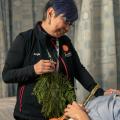Magnetic resonance imaging (MRI)
A guide to what to expect during a magnetic resonance imaging (MRI) test and resources for further information.
Overview
Magnetic resonance imaging (MRI) is digital imaging that produces images of tissues and organs in a patient’s body.
Radio waves and a powerful magnetic field are used to produce images of almost any part of your body. Doctors can use these images to help them diagnose certain conditions. An MRI is typically used as a second step to confirm or further evaluate results found on other images such as ultrasound or CT scans.
MRI is especially useful for diagnosing diseases and conditions in soft tissues, such as:
- Nerve and spinal cord problems
- Assessment for tumours
- Muscle and tendon tears
- Joint injuries
- Abnormal heart activity
- Bleeding or aneurysms
- Infections and abscesses, especially in bones
- Abnormalities in blood vessels
Preparing for the test
Please arrive early to give yourself time to check in. Please bring with you photo identification and your BC Care Card (personal health number).
Our staff will speak with you in English. If you are not fluent in English, please bring an adult interpreter with you who is able to stay for the entire test.
If you are not able to keep your appointment, please call the department right away. By giving us at least 24 hours notice we are able to use your time slot for another patient. We will try to give you another date and time for your test when you call.
Please do not wear perfume, cologne, or aftershave to your appointment. Some people are allergic to fragrance ingredients and can suffer severe reactions.
On the day of the test
Before your exam starts, an MRI technologist will review the safety screening questions with you. The technologist will make sure that you have no other conditions that would prevent you from having an MRI. After the technologist has reviewed the screening form, you will go to a change room to change into a hospital gown and remove all electronic and metal objects. A safe locker will be provided for your belongings.
When you are ready for your exam, the technologist will bring you into the MRI scan room. The technologist will help position you on the scan bed to get the best images possible. For many exams, an MRI camera, known as a ‘coil’, is positioned around the body part being scanned.
The machine is extremely loud and emits a number of different noises during the exam while it produces the images. These noises could cause hearing damage if no hearing protection is used. The technologist will give you either earplugs or headphones. This will provide hearing protection and reduce the noise to a safe level for you.
Once all the equipment is set up and you are ready for your exam, the technologist will move you into the machine and then position you so the body part being scanned is in the centre of the machine. The technologist will then step into the control room to operate the machine. Throughout the scan, the technologist will keep an eye on your progress and occasionally check on you using the intercom.
MRI scans are quite long, usually 30-60 minutes, but some scans may be two hours or longer. It is important to hold still and stay as relaxed as possible, as motion will affect the images and make them less helpful.
After the test
Complications and side effects
There are no known complications from exposure to the MRI magnet, and ionizing radiation is not used for MRI scans. After your MRI scan is completed, you can go about your day as you normally would.
If you are pregnant or think you may be pregnant, please let the technologist know before your exam.
There are no known risks associated with pregnancy and MRI. However, as the first trimester is a relatively sensitive time in the development of your baby, it is our policy to postpone non-urgent MRIs for women in that period. If you are or may be pregnant, we may delay your exam, or suggest an alternative type of diagnostic test.
Support for Indigenous Peoples
The Indigenous Wellness Liaison Team is here to support your health journey. Team members offer cultural support and healthcare advocacy. Learn more below or call them at 604-682-2344,62937 or email IWL@providencehealth.bc.ca.

